Dean Ornish Diet Food List
Get StartedOr call 1-877-888-3091
Love Your Life.
Start Feeling Better Now


 Nutrition
Nutrition
What you include in your diet is as important as what you exclude.

Delicious & Nutritious Ingredients for Reversal
Our approach to nutrition is all about feeling good, experiencing a joy of living, not a fear of dying. When you eat this way, you will lose weight and gain health. What's sustainable is pleasure and feeling good, so relish in this delicious and nutritious way of eating!
Ornish Lifestyle Medicine has been scientifically proven to reverse the progression of even severe coronary heart disease, type 2 diabetes, hypercholesterolemia, and high blood pressure as well as to slow, stop, or even reverse the progression of early-stage prostate cancer in a series of randomized controlled trials published in leading peer-reviewed journals.
We also found that changing lifestyle changes your genes—turning on protective genes and turning off genes that promote inflammation, oxidative stress, and oncogenes that promote prostate cancer, breast cancer, and colon cancer—over 500 genes in only 3 months. In addition, these lifestyle changes lengthen telomeres, the ends of our chromosomes that regulate aging, thereby beginning to reverse aging at a cellular level.
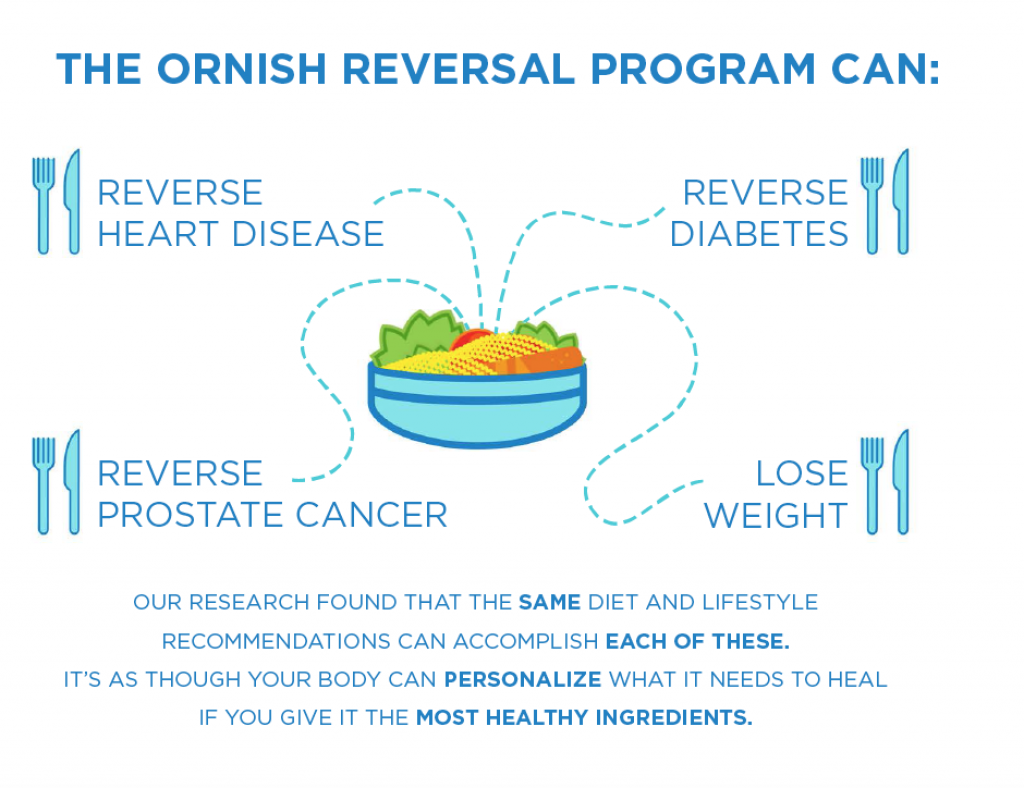
Ornish Lifestyle Medicine™ Dietary Guidelines
Foods are neither good nor bad, but some are more healthful for you than others — predominantly fruits, vegetables, whole grains, legumes, soy products, nonfat dairy, and egg whites in their natural forms, as well as some good fats that contain omega 3 fatty acids. These are the foods that are rich in good carbs, good fats, good proteins and other protective substances. There are at least 100,000 substances in these foods that have powerful anti cancer, anti-heart-disease and anti-aging properties. What you include is as important as what you exclude.
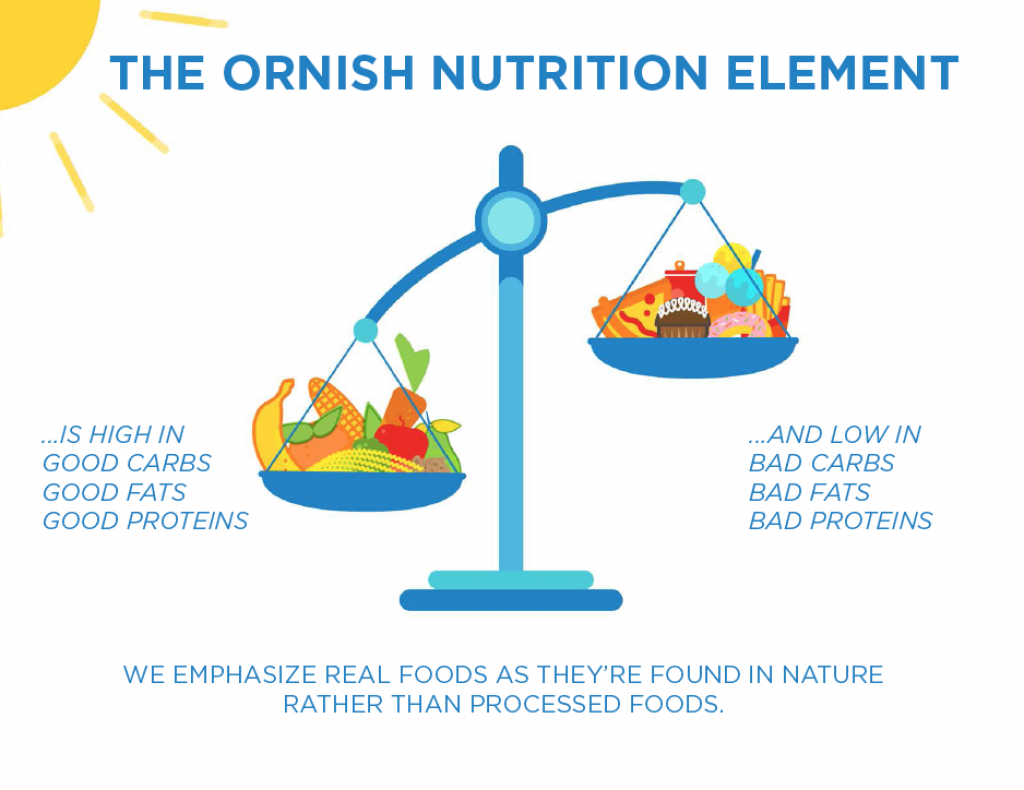
Eat Mostly Plants in Their Natural Form
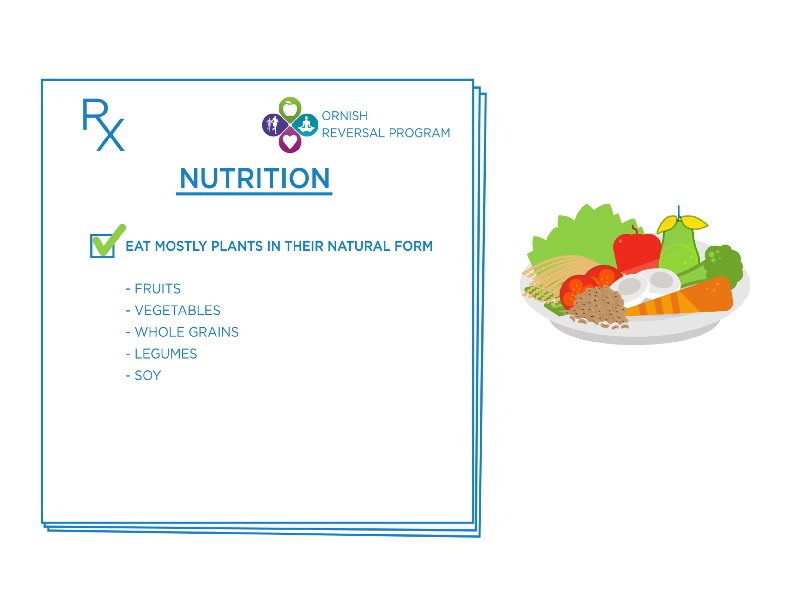
Your calories are unrestricted unless you're trying to lose weight. Small frequent meals spread throughout the day will help you to avoid hunger and keep your energy levels constant. Portion control will assist you in reaching and maintaining a healthy body weight and controlling blood sugar levels. Non-fat dairy foods (no more than 2 servings/day) and egg whites are included. Note: Meat, poultry, fish and any products made from these foods are eliminated.
Limit Bad Carbs
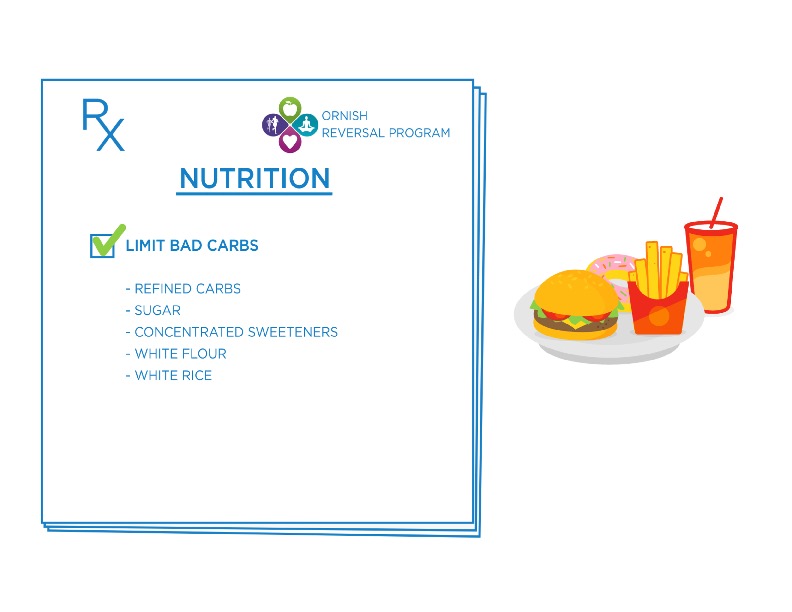
Sugar is permitted in moderation, but not encouraged. Added sugars such as maple syrup, agave, honey, white or brown sugar, along with non-fat sweets, and refined carbohydrates are recommended to limit to more than 2 servings/day.(See Ornish Living article, Understanding Sugar: Added Vs. Natural)
Alcohol, is allowed in limited amounts, but not encouraged. If consumed, enjoy one serving a day: 1.5 ounces liquor, 4 ounces wine or 12 ounces beer.
4 Grams a Day of Good Fat
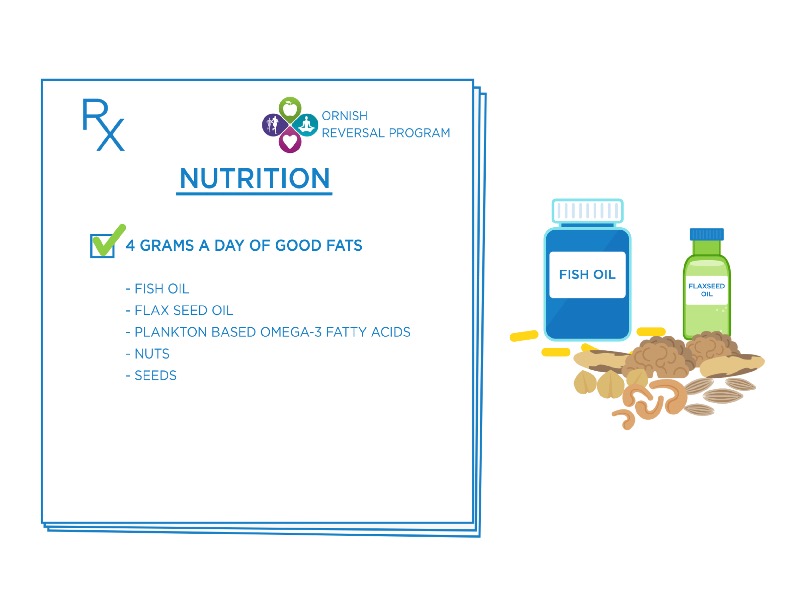
No more than 10% of calories are from fat. This is achieved by not adding any fats, oils, avocados, coconut and olives to a mostly plant-based diet. The 10% of calories from fat comes from fat that occurs naturally in grains, vegetables, fruit, beans, legumes, soy foods — and small amounts of nuts & seeds.
Limit cholesterol to 10 milligrams or less per day. To meet this goal, non-fat dairy products are optional and limited to 2 servings per day. Non-fat dairy products are optional. Non-dairy alternatives are encouraged, such as soy milk, as they are cholesterol-free and rich in heart-healthy nutrients.
Nuts are allowed in small amounts. To maintain the low-fat goal of 10 % of calories from fat, servings sizes for nuts are limited since they are very concentrated in fat. An example of some servings for nuts are listed below. The type of fat in nuts is mostly unsaturated with some nuts such as walnuts providing a good sources of heart-healthy omega 3s. Specific nuts(almonds, pistachios, walnuts, pecans, cashews, and peanuts) and seeds (especially flaxseeds, sunflower, and pumpkins seeds) that are rich in antioxidants and cardio-protective phytochemicals such as polyphenols were selected based on research for their cardiovascular health benefits.
Example: 1 low-fat food serving (≤ 3 gm fat) equals:
- 5 almonds
- 9 pistachios
- 1 whole walnut
- 3 pecan halves
- 2 cashews
- 6 peanuts (no shell)
- 2.5 tsp flax seeds, ground
- 2 tsp chia seeds or sunflower seeds, shelled
- 1.5 tsp pumpkin seeds
Three or less servings from low-fat foods or nuts can be included per day. Low-fat foods such as packaged foods like veggie burgers, low fat whole-grain crackers or cereals that contain ≤ 3 gm fat per serving. These low-fat foods may contain a minimum amount of added mostly unsaturated fat such as olive or canola oil. Low fat packaged foods are not encouraged, but are optional on occasion for convenience, and to maintain an enjoyable sustainable lifestyle.
Eat Mostly Plant-Based Proteins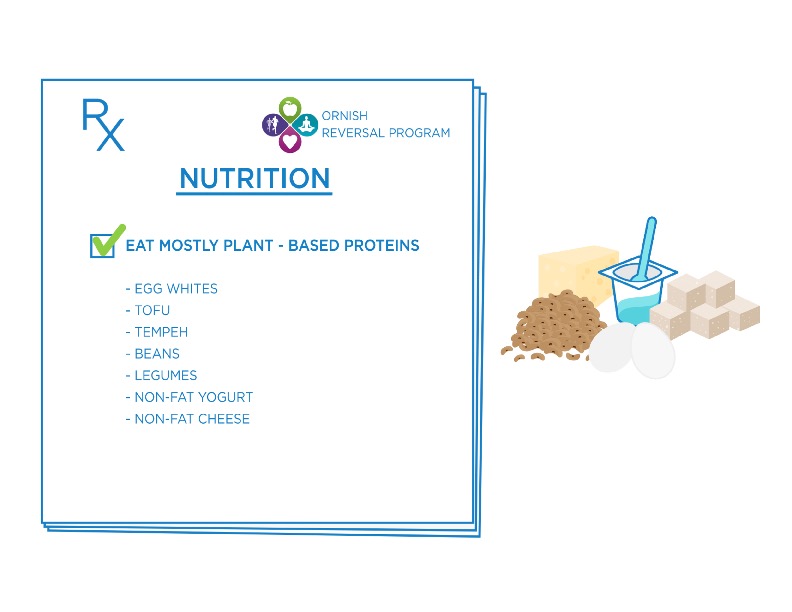
Sodium
Moderate salt use, unless medically indicated otherwise. It is encouraged to flavor food with spices, herbs and other natural flavor enhances such as citrus, and vinegars.
Caffeine
Our lifestyle medicine program encourages reducing the intake of stimulants such as caffeine in order to facilitate a more balanced, calm and peaceful way of living. Up to 2 cups/day of green tea has been included for many years due to its high concentration of health-promoting and cell-protective antioxidant polyphenols, which have shown to improve cardiovascular health. Black tea and coffee also contain these antioxidant polyphenols and other bioactive compounds providing cardio-protective benefits. Coffee and tea are optional if you are already drink coffee and able tolerate caffeine well. Coffee is limited to 1 cup or less of coffee or up to 2 cups decaf or up to 2 cups of black tea a day.
We are not encouraging people to begin drinking coffee or tea who are not already doing so, and those with arrhythmias, high blood pressure, anxiety, insomnia, gastro-esophageal reflux or who are caffeine-sensitive should continue to avoid it. Please consult with your physician if you have any concerns.
Supplements
We recommend a low dose multivitamin and mineral supplement with B-12 (without iron, if not of childbearing age), fish oil and, possibly upon the advice of a physician, calcium supplements.
Source: https://www.ornish.com/proven-program/nutrition/